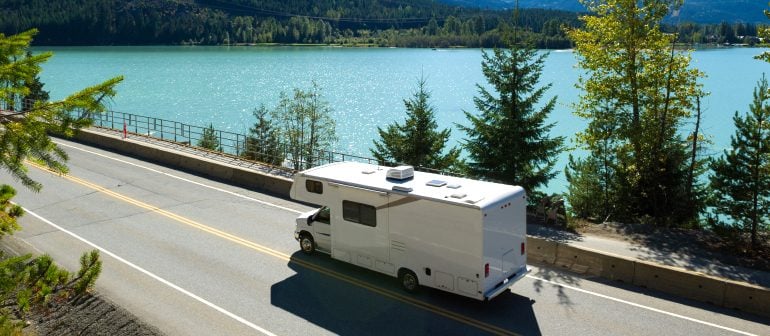How to Find the Best RV Insurance

Many, or all, of the products featured on this page are from our advertising partners who compensate us when you take certain actions on our website or click to take an action on their website. However, this does not influence our evaluations. Our opinions are our own. Here is a list of our partners and here's how we make money.
Whether you plan on using your RV as a full-time home or for occasional road trips, insurance is a must. Adding your RV to an existing car insurance policy may be an option, but RVs are much more than just cars. For better financial protection, consider RV insurance. This coverage combines elements of auto and home insurance to account for the unique potential problems with a recreational vehicle.

See what you could save on car insurance
Easily compare personalized rates to see how much switching car insurance could save you.What basic RV insurance covers
A basic RV insurance policy may include slightly different coverage types depending on the insurer, but you can expect the following to be required or added automatically when you get a quote:
Liability insurance: To legally operate your RV, you’ll need at least the same amount of liability coverage that your state requires for car insurance. If you ever cause a crash, liability covers others’ injury and property damage costs, up to your limit.
Collision and comprehensive coverage: Collision coverage helps pay for repairs to your RV if you cause a crash or run into objects such as a tree or street sign.
Comprehensive covers a variety of issues, including theft of your RV, animal collisions, falling objects, vandalism and more.
Note that collision and comprehensive come with a deductible, which is the amount your insurer subtracts from claim payments. If you file a claim for $2,000 to repair damage from a fallen tree branch, for instance, and you have a $500 deductible, your settlement would be $1,500.
Uninsured/underinsured motorist coverage: Uninsured/underinsured motorist bodily injury coverage helps cover your and your passengers’ injury treatment if you’re hit by a driver who doesn’t have insurance, or who has some insurance but not enough to cover your bills.
Uninsured/underinsured motorist property damage coverage kicks in at the same time but goes toward repairing your damaged RV.
Medical payments coverage: If you crash your RV, this coverage pays for injury treatment for you and your passengers, no matter who was at fault in the incident.
Other RV insurance options
If you want only the basics, such as liability insurance, comprehensive and collision, consider adding your RV to your auto policy, which offers those same benefits.
However, RV insurance includes several additional options that car insurance can’t.
Full replacement cost: If your RV is stolen or totaled, comprehensive coverage through car insurance typically pays a depreciated replacement amount. This means you only get back what your RV was worth at the time of the loss. With RV insurance, on the other hand, you can choose full replacement cost and get back what you paid for your vehicle.
Personal property and attachments coverage: RVs are made to be loaded with items and attachments that a traditional auto policy won’t cover, such as cooking appliances, sporting and camping supplies, satellite dishes, awnings and furniture. If your stuff is stolen or damaged, you’d need separate RV insurance to repair or replace it.
Vacation liability coverage: When your RV is in a park or campsite, it’s considered a temporary vacation residence. It’s wise to have liability insurance to cover the damages in case, say, someone is injured inside your RV or you accidentally throw a football through a neighboring camper’s window.
Roadside assistance: RV insurance can provide high-limit coverage to account for the steep prices associated with towing and servicing mammoth RVs.
Travel expenses coverage: If you have an accident or your RV breaks down, this coverage helps pay for lodging and transportation while your vehicle is fixed. It typically applies only when you’re a certain distance from home, usually at least 50 or 100 miles, depending on your insurer.
Full-time RV coverage: This coverage is required if you’re using your RV as your primary residence. Among other benefits, it can provide high-limit personal liability insurance similar to what you’d find in a home insurance policy, medical payments for injured visitors and coverage for belongings you keep in storage while you’re on the road.
What’s excluded from RV insurance
Depending on your insurer, travel trailers, campers and other non-motorized units may not fall under RV insurance; they would need their own separate policies.
Also, even though RVs are ideal for traveling far and wide, most companies won’t cover you in Mexico; talk to your insurer about finding Mexican RV insurance if you’re planning on heading south of the border.
You are, however, typically covered in Canada, but ask your insurer to make sure. They may issue a non-resident insurance card that you can show to Canadian authorities.
Who needs RV insurance
If you live in your RV full time, separate RV insurance is a necessity. If you use your RV sporadically for vacations and road trips, you’ll need liability insurance at the very least. If you got an RV loan, your lender may require insurance.
Adding your RV to your car insurance may work if your vehicle is older and lacks frills such as attachments, electronics and appliances.
An RV insurance policy is the better choice if you want these perks:
Full replacement cost for your RV and its contents.
Coverage for lodging if your RV breaks down.
Personal liability insurance in case guests are injured in your vehicle.
Coverage for RV attachments such as awnings and satellite dishes.

See what you could save on car insurance
Easily compare personalized rates to see how much switching car insurance could save you.Where to buy RV insurance
RV insurance is available through several well-known companies that offer a wide range of insurance products, including:
You can also get insurance from smaller companies that specialize in RVs, such as:
Blue Sky
Good Sam Club
RV America
RV insurance rates are hard to estimate given all the ways you can customize and use your vehicle. It’s worthwhile to explore companies both big and small, as shopping around and comparing a variety of quotes is the best way to learn who has the coverage options you’re looking for at the most competitive prices.